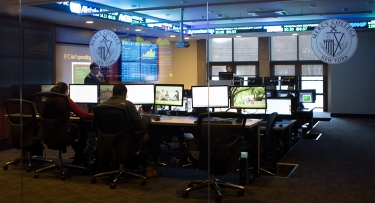Maverick Magazine Spring 2022: Mercy Students Top Performers in Bloomberg Trading Challenge

Hands-on learning is a major element of a Mercy College education, and the 2021 Bloomberg Trading Challenge (Challenge) did not disappoint in providing School of Business (SBUS) students an opportunity to apply their classroom knowledge to a real-world scenario. Mercy students performed incredibly well in the seven-week investing competition run by Bloomberg, gaining real-world experience that will serve them well in any financial career. Mercy’s top-performing team finished #3 in North America and #7 globally while competing against 496 teams from countries including the United States, India, China, Colombia, Italy, Saudi Arabia and New Zealand.
“Finance is brand new to me, and the Bloomberg Trading Challenge made me absolutely fascinated with understanding how it works—both what the patterns are and what is driving them,” said Heather Apollonio, M.B.A. ’23, Mercy’s director of advancement operations and prospect management, who led one of Mercy’s student teams.
The Challenge is an investment competition for undergraduate and graduate students that takes place entirely within Bloomberg Terminal, a software system that finance professionals use to analyze real-time financial market data and execute trades. The Challenge involved students working in small teams to invest $1 million in virtual money between October 4 and November 19, 2021, with the goal of constructing a portfolio that earned the greatest returns above the Bloomberg World Large, Mid & Small Cap index.
Within Mercy College, 12 teams, comprised of 49 students, participated. Several professors in the SBUS served as faculty advisors and were available to consult with teams. “It was exciting for Mercy students to be able to use Bloomberg Terminals, and it’s great professional preparation,” said Zach Williams, Ph.D., assistant professor in the SBUS who serves as the Bloomberg program coordinator for Mercy’s graduate business program and advised several teams. He explained that most financial institutions use Bloomberg Terminal and that being proficient puts students a step ahead in the job market.
“Participating in this competition demonstrates Mercy College’s ongoing commitment to provide hands-on, experiential learning opportunities that will better prepare our students for jobs and careers,” said Lloyd G. Gibson, D.Sc., dean of the SBUS. “And the strong performance of Mercy teams demonstrates that our students can successfully compete with students from schools all over the world.”
Mercy team captain Anis Meah ‘23, a finance major, explained that his team got a slow start, ranking #433 globally in the second week after starting late. At first, they invested in companies that they believed had a competitive advantage over others, but they quickly shifted to investing based on their analysis of company data such as earnings reports.
Similarly, Paal Andreas Furuseth ‘23, a finance major, also attributed his success ranking as #2 at Mercy and #20 globally to strong data analysis, a skill he honed while investing his own money, “You never want to trade stocks of companies that you don’t know. Know what you own.” His team earned a total profit of $165,583 by investing primarily in Bitcoin-related stocks and a vaccine company. In the third week of the Challenge, his team even ranked #1 in the United States.
The team that finished #4 at Mercy and #161 globally with a profit of $71,019 also built a portfolio that was heavy in biotech. This meant that the team, M.B.A. ’23 students who are also Mercy employees—Apollonio, Stephanie Blum, associate director of annual giving and Rob Cornetta, associate director of PACT, Mercy Scholars—monitored the Food and Drug Administration’s vaccine approvals closely. They also followed Tesla and Elon Musk closely. Apollonio asserted that since the Challenge was only seven weeks long, the way to succeed was to take big risks. Early in the Challenge, Tesla’s stock began to rise and gained momentum. The team invested at $900 per share, and the stock ended up increasing to over
$1,200.
More important than their team rankings, the students came away with new insights and skills. Meah gained a new outlook on teamwork: “I don’t really like depending on others to get things done. But I learned that if you find the right teammates, they can be great assets.” Furuseth continues to be passionate about pursuing a career in finance and looks forward to next year’s Challenge: “Every single business student should be part of this. You get the chance to learn a lot. It’s amazing that Mercy gives students a chance to do this.”
To read the spring 2022 issue of Maverick Magazine, please click here.
To read more articles from the spring 2022 issue of Maverick Magazine, please click here.
